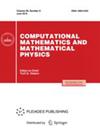量子退火法线性方程求解算法的收敛率
IF 0.7
4区 数学
Q3 MATHEMATICS, APPLIED
Computational Mathematics and Mathematical Physics
Pub Date : 2024-06-13
DOI:10.1134/s0965542524700325
引用次数: 0
摘要
摘要 研究了利用量子计算机按照量子退火原理求解线性方程 \(ax = b\) 的各种迭代算法。假定计算机产生的结果由玻尔兹曼分布描述,得到了这些算法收敛的条件,并对其收敛速率进行了估计。研究还考虑了这种方法在使用无限量量子比特和少量量子比特的算法中的应用。本文章由计算机程序翻译,如有差异,请以英文原文为准。

Convergence Rate of Algorithm for Solving Linear Equations by Quantum Annealing
Abstract
Various iterative algorithms for solving the linear equation \(ax = b\) using a quantum computer operating on the principle of quantum annealing are studied. Assuming that the result produced by the computer is described by the Boltzmann distribution, conditions under which these algorithms converge are obtained and an estimate of their convergence rate is provided. Application of this approach for algorithms that use an infinite number of qubits and a small number of qubits is considered.
求助全文
通过发布文献求助,成功后即可免费获取论文全文。
去求助
来源期刊

Computational Mathematics and Mathematical Physics
MATHEMATICS, APPLIED-PHYSICS, MATHEMATICAL
CiteScore
1.50
自引率
14.30%
发文量
125
审稿时长
4-8 weeks
期刊介绍:
Computational Mathematics and Mathematical Physics is a monthly journal published in collaboration with the Russian Academy of Sciences. The journal includes reviews and original papers on computational mathematics, computational methods of mathematical physics, informatics, and other mathematical sciences. The journal welcomes reviews and original articles from all countries in the English or Russian language.
 求助内容:
求助内容: 应助结果提醒方式:
应助结果提醒方式:


